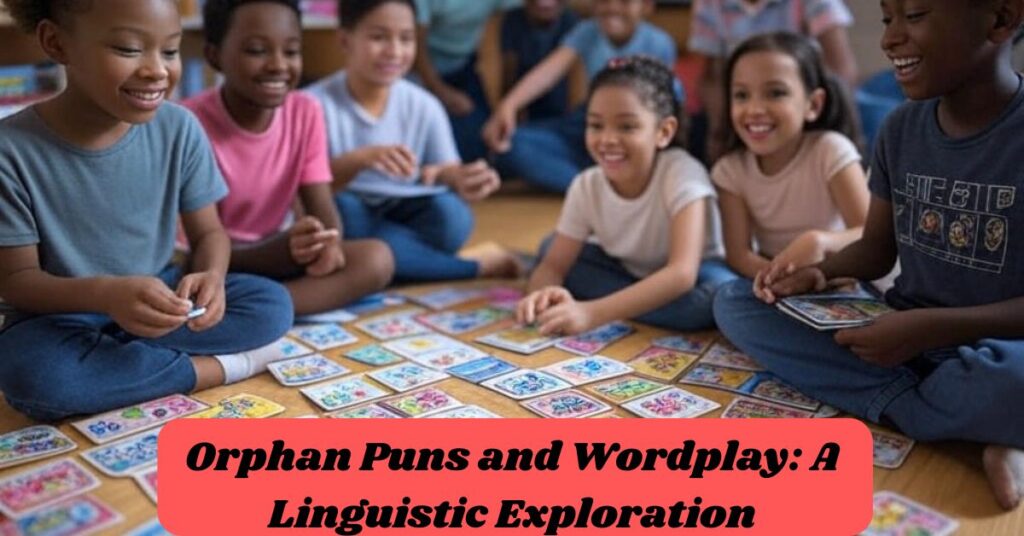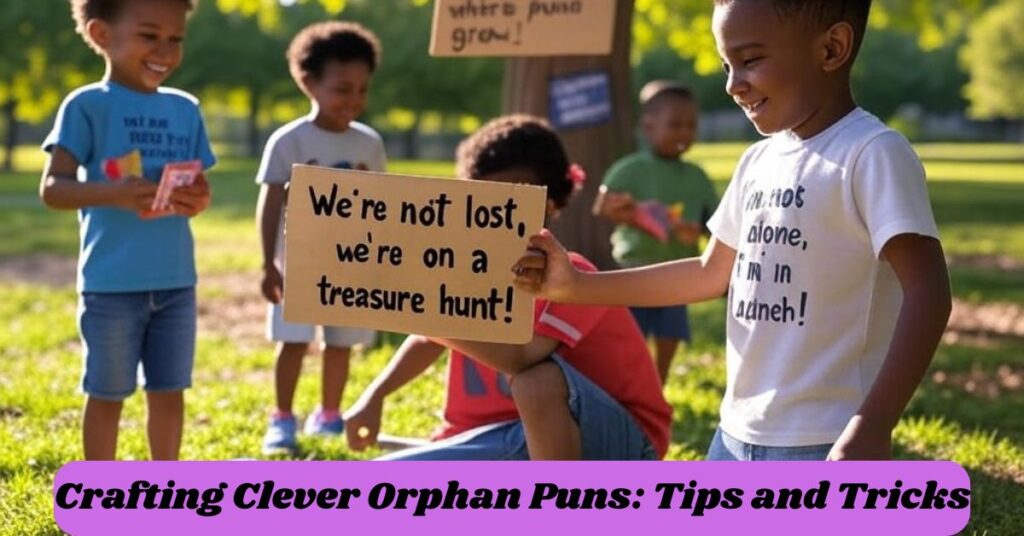Humor helps us navigate difficult topics. Sometimes the most challenging subjects need a touch of levity. Dark humor serves as a coping mechanism for many. It creates distance from painful realities. Orphan puns walk a fine line between comedy and sensitivity.
This collection explores wordplay that acknowledges the complexity of family structures. The best jokes contain elements of both laughter and reflection. Finding humor in difficult situations demonstrates resilience.
These puns showcase linguistic creativity while addressing a sensitive topic. Remember that context and audience awareness matter greatly. What follows is a collection carefully curated for those who appreciate nuanced humor.
Best Orphan Puns So Bad They’ll Make You Laugh Then Cry
- “Orphans are terrible at playing baseball because they don’t know where home is.”
- “What’s an orphan’s favorite day? Parent-teacher conference day no lines!”
- “Orphans excel at hide and seek because nobody is looking for them.”
- “The orphan’s favorite book? ‘A Series of Unfortunate Events” they call it an autobiography.”
- “Orphans never play ‘knock knock’ jokes because nobody’s home to answer.”
- “Why did the orphan become a computer programmer? They were good at handling parent functions.”
- “Orphans make great criminals because they’re used to getting away with no one to catch them.”
- “What’s an orphan’s favorite game? Solitaire they’re used to playing alone.”
- “Orphans don’t suffer from empty nest syndrome.”
- “Why do orphans make excellent astronomers? They’re always looking for their stars.”
- “The orphan’s favorite movie? Home A-lone.”
- “Orphans excel at making independent decisions no parental approval needed.”
- “What’s an orphan’s favorite song? ‘I Walk This Road Alone‘.”
- “Orphans never argue about which parent they look like more.”
- “Why are orphans so good at poker? They’ve mastered the straight face.”
- “Orphans don’t have to worry about disappointing their parents with bad grades.”
- “What do you call an orphan taking a selfie? A family portrait.”
- “Orphans excel at gift giving they know exactly what they would want.”
- “Why do orphans make great detectives? They’re always searching for missing persons.”
- “The hardest part about being an orphan? Writing the family section of school assignments.”
Adopting Orphan Puns: Finding the Laughter
The art of crafting orphan puns requires balance. Effective puns play with words in unexpected ways. Many orphan jokes rely on the concept of absence. The humor often stems from linguistic subversion. Finding humor helps process difficult realities.
Good puns create cognitive connections that surprise us. The most memorable orphan jokes twist common expressions. They reframe familiar family concepts in unexpected contexts. Dark humor provides emotional release for many. These jokes allow us to acknowledge difficult truths through wordplay.
- “Orphans always win at Simon Says no one tells them what to do anyway.”
- “An orphan’s favorite game? Guess Who every answer is wrong.”
- “Why do orphans make excellent entrepreneurs? They’re accustomed to self-reliance.”
- “What’s an orphan’s favorite holiday? Independence Day.”
- “Orphans excel at keeping secrets they have no one to tell.”
- “Why are orphans good at math? They know the value of being a single child.”
- “Orphans never have to worry about their parents embarrassing them in public.”
- “What do you call an orphan comedian? A stand-alone act.”
- “Orphans make excellent astronauts they’re used to the void.”
- “Why do orphans make great philosophers? They’re constantly pondering existential questions.”
- “Orphans never have to share the television remote.”
- “What’s an orphan’s favorite exercise? Solo hiking.”
- “Orphans never have to attend awkward family reunions.”
- “Why are orphans good at chess? They know what it’s like to lose important pieces.”
- “Orphans never have to worry about living up to family expectations.”
Orphan Jokes: Navigating the Line Between Funny and Heartfelt
Finding the appropriate tone matters tremendously. Effective orphan humor acknowledges complex emotions. The best jokes contain elements of both wit and warmth. Dark humor serves as a bridge to difficult conversations.
Orphan jokes can highlight resilience rather than victimhood. The context determines whether a joke lands well. Shared humor creates community among those with similar experiences. Self-deprecating jokes differ from those made at others’ expense. The intention behind the joke matters more than the joke itself. Thoughtful humor can transform pain into perspective.
- “Orphans never have to deal with favoritism among siblings.”
- “What’s an orphan’s favorite game show? ‘Who Wants to Be a Millionaire?’ they already know the phone-a-friend option is out.”
- “Orphans make great judges; they have no family biases.”
- “Why do orphans excel at memoir writing? They’ve mastered the art of self-reflection.”
- “Orphans never have to worry about inheriting bad genetic traits.”
- “What’s an orphan’s favorite board game? Monopoly, they’re used to playing all the pieces themselves.”
- “Orphans excel at adapting to new environments.”
- “Why are orphans good at navigation? They’re always finding their own way.”
- “Orphans never have to hear ‘Because I said so’ as a reason.”
- “What’s an orphan’s favorite song? ‘I Did It My Way’.”
- “Orphans never have to worry about family drama during the holidays.”
- “Why do orphans make excellent therapists? They understand emotional independence.”
- “Orphans never have to endure being compared to their siblings.”
- “What’s an orphan’s favorite flower? Forget me nots.”
- “Orphans excel at creating their own traditions.”
The Psychology Behind Orphan Humor: Why We Laugh
Humor serves as a coping mechanism during difficult times. Laughter releases endorphins that combat stress hormones. Cognitive incongruity theory explains why unexpected connections amuse us. Dark humor creates psychological distance from painful topics. Finding humor in hardship demonstrates emotional resilience.
The contrast between expectation and punchline creates relief. Our brains enjoy solving the puzzle of understanding wordplay. Shared laughter builds community among those with similar experiences. Humor helps normalize discussion of challenging topics. The temporary reframing through jokes provides emotional breathing room.
- “Orphans never have to deal with overprotective parent syndrome.”
- “What’s an orphan’s favorite movie genre? Independent films.”
- “Orphans excel at making their own decisions.”
- “Why do orphans make great writers? They’re experts at creating fictional families.”
- “Orphans never have to worry about disappointing their ancestors.”
- “What’s an orphan’s favorite part of a dictionary? The appendix it’s also unnecessary.”
- “Orphans excel at finding their own path.”
- “Why are orphans good at meditation? They’re comfortable with emptiness.”
- “Orphans never have to endure lengthy family photographs.”
- “What’s an orphan’s favorite song? ‘I Am My Own Hero‘.”
- “Orphans excel at handling solitude.”
- “Why do orphans make excellent spies? No family connections to trace.”
- “Orphans never have to listen to the same childhood stories repeatedly.”
- “What’s an orphan’s favorite card game? Solitaire.”
- “Orphans excel at creating chosen families.”
Orphan Puns and Wordplay: A Linguistic Exploration

Orphan jokes often rely on semantic ambiguity. Many puns play with dual meanings of family-related terms. Linguistic exploration reveals our cultural assumptions about family. Homonyms provide rich material for creative wordplay. The subversion of expected meaning creates humorous effects.
Puns highlight the flexibility of language itself. Good wordplay challenges our cognitive patterns. The unexpected linguistic connections surprise our brains. Metaphorical thinking enhances our understanding of complex topics. The collision of literal and figurative meanings generates laughter.
- “Orphans never have to worry about living in their parents’ shadow.”
- “What’s an orphan’s favorite social media platform? Solo gram.”
- “Orphans excel at creating their own identity.”
- “Why do orphans make excellent gardeners? They understand growing without roots.”
- “Orphans never have to explain their life choices to relatives.”
- “What’s an orphan’s favorite musical instrument? The solo piano.”
- “Orphans excel at finding surrogate mentors.”
- “Why are orphans good at business? They know how to start from nothing.”
- “Orphans never have to participate in awkward family traditions.”
- “What’s an orphan’s favorite movie quote? ‘May the force be with you… always‘.”
- “Orphans excel at creating meaningful connections.”
- “Why do orphans make excellent teachers? They value the power of self-education.”
- “Orphans never have to sit through boring family slideshows.”
- “What’s an orphan’s favorite constellation? Orion the hunter who stands alone.”
- “Orphans excel at building chosen communities.”
Read This Blog : Is Cutsco2d Software Safe to Download? A Comprehensive Review
Orphan Jokes in Popular Culture: From Literature to Film
Fictional orphans appear frequently in literature. Characters like Harry Potter resonate with universal themes. Orphan narratives often follow the hero’s journey structure. Batman represents the orphan who transforms trauma into purpose. Annie’s optimism showcases resilience despite difficult circumstances.
Oliver Twist reveals social commentary through an orphan’s perspective. Popular culture uses orphan characters to explore independence. The orphan archetype appears across diverse storytelling traditions. These narratives often highlight found family connections. Films frequently use orphan characters to explore themes of belonging.
- “Orphans never have to deal with embarrassing baby photos.”
- “What’s an orphan’s favorite comic book hero? Batman for obvious reasons.”
- “Orphans excel at understanding the concept of chosen family.”
- “Why do orphans make excellent poets? They understand the depth of absence.”
- “Orphans never have to endure awkward family dinner conversations.”
- “What’s an orphan’s favorite book series? ‘A Series of Unfortunate Events’.”
- “Orphans excel at finding meaningful connections beyond blood relations.”
- “Why are orphans good at philosophy? They contemplate existence from early on.”
- “Orphans never have to worry about living up to family legacies.”
- “What’s an orphan’s favorite holiday? Thanksgiving they’re thankful for what they do have.”
- “Orphans excel at creating their own destiny.”
- “Why do orphans make excellent leaders? They develop strong independence early.”
- “Orphans never have to endure parental lectures.”
- “What’s an orphan’s favorite song? ‘I Will Survive‘.”
- “Orphans excel at appreciating the present moment.”
Crafting Clever Orphan Puns: Tips and Tricks

Effective orphan puns require sensitivity. Consider your audience before sharing dark humor. The best jokes contain elements of both surprise and recognition. Use linguistic ambiguity to create multiple meanings. Focus on resilience rather than victimhood in your wordplay.
Timing matters tremendously with sensitive humor. Self-deprecating humor differs from mockery. Create unexpected connections between common phrases. Play with family-related idioms to generate new meanings. Remember that humor serves as both entertainment and coping mechanism.
- “Orphans never have to choose sides during parental disagreements.”
- “What’s an orphan’s favorite movie? Home Alone (but every day).”
- “Orphans excel at creating meaningful relationships outside blood ties.”
- “Why do orphans make excellent psychologists? They understand attachment theory firsthand.”
- “Orphans never have to worry about inheriting family drama.”
- “What’s an orphan’s favorite game? Solitaire no family cards to deal with.”
- “Orphans excel at defining their own identity.”
- “Why are orphans good at space exploration? They’re comfortable with the void.”
- “Orphans never have to endure ‘When I was your age’ stories.”
- “What’s an orphan’s favorite quote? ‘Be the change you wish to see‘.”
- “Orphans excel at developing independence.”
- “Why do orphans make excellent entrepreneurs? No family business to inherit they create their own.”
- “Orphans never have to attend boring family reunions.”
- “What’s an orphan’s favorite saying? ‘Found family is thicker than water’.”
- “Orphans excel at finding meaning through personal journeys.”
Ethical Considerations When Using Orphan Jokes: A Guide
Context determines the appropriateness of orphan humor. Consider whether your joke punches up or down. Respect those with lived experiences related to your jokes. Humor should never minimize genuine trauma. The intention behind your joke matters tremendously.
Self-deprecating humor differs from mockery of others. Creating safe spaces for emotional expression matters. Remember that laughter can both heal and hurt. Personal experience affects how jokes are received. Sensitivity doesn’t eliminate humor but shapes its expression.
- “Orphans never have to worry about disappointing their ancestors.”
- “What’s an orphan’s favorite app? Self-timer for photos.”
- “Orphans excel at finding their own moral compass.”
- “Why do orphans make excellent novelists? They’re masters of character development.”
- “Orphans never have to endure unwanted family advice.”
- “What’s an orphan’s favorite musical? Annie, they relate to optimism.”
- “Orphans excel at forming deep friendships.”
- “Why are orphans good at negotiation? They don’t have a backup to rely on.”
- “Orphans never have to explain their life choices at family gatherings.”
- “What’s an orphan’s favorite saying? ‘Home is where you make it‘.”
- “Orphans excel at defining their own success.”
- “Why do orphans make excellent inventors? They think outside family traditions.”
- “Orphans never have to deal with parental expectations.”
- “What’s an orphan’s favorite thing about hotels? The independence of room service.”
- “Orphans excel at appreciating the connections they do have.”
Frequently Asked Questions
Is it ever appropriate to make orphan jokes?
Dark humor can be appropriate when shared by those with similar experiences or when delivered with sensitivity and awareness. Context and audience matter tremendously.
Why do people find orphan jokes funny despite the sensitive topic?
Psychological distance allows us to process difficult emotions through humor. The incongruity between expectation and punchline creates cognitive relief.
Can orphan jokes be therapeutic?
For many, including those with relevant experiences, dark humor serves as a coping mechanism and creates community through shared laughter.
Should orphan jokes be avoided completely?
Rather than complete avoidance, focus on intention, context, and audience awareness when sharing orphan humor.
How can I tell if an orphan joke crosses the line?
Consider whether the joke reinforces harmful stereotypes, mocks vulnerable populations, or lacks any redeeming insight beyond cruelty.
Conclusion
Orphan puns walk a delicate line between humor and sensitivity. The best jokes acknowledge the complexity of family structures while finding genuine moments of levity. Dark humor serves important psychological functions for many people. Finding laughter in difficult circumstances demonstrates remarkable resilience.
The linguistic creativity behind orphan puns showcases our ability to reframe challenging realities. Context always matters when sharing sensitive humor. The intention behind the joke matters more than the joke itself. Creating space for both laughter and reflection honors the full range of human experience.
Thoughtful humor can transform pain into perspective. Remember that the best jokes contain elements of both recognition and surprise. By approaching difficult topics with both wit and warmth, we create opportunities for meaningful connection.










